Beth Kephart's Blog, page 204
January 15, 2012
The Proust Smackdown (Clooney, Damon, Craig, Vanity Fair)

Just a questionnaire, a magazine spread (Vanity Fair, February 2012). But don't these responses tell you everything?
What is your idea of perfect happiness?
Clooney: Laughter
Damon: My children, happy and within an arm's length
Craig: Awake at dawn with nothing to do.
What is the quality you most like in a man?
Clooney: Loyalty
Damon: Honesty
Craig: A good mustache
What is the quality you most like in a woman?
Clooney: Kindness
Damon: Honesty
Craig: A good mustache
How would you like to die?
Clooney: With dignity
Damon: Peacefully, surrounded by people I love and who love me
Craig: Quickly




Published on January 15, 2012 06:44
January 14, 2012
This Will Be Difficult to Explain and Other Stories/Johanna Skibsrud: Reflections

It had entered the realm of the absurd: I had been carrying Johanna Skibsrud's collection of nine short stories with me everywhere I went. This Will Be Difficult to Explain was so slender, after all, and had arrived unbidden from W.W. Norton. I didn't know this author, but I was intrigued. Consider the comparators: Alice Munro and Marilynne Robinson. Nicole Krauss, even.
The book traveled on the train, to client offices, to Body Combat, to ballroom dance, to the library, and in the passenger seat of the car, just for the apparent heck of it. Meanwhile, weeks of inane insanity went by—a battle cry of must-do-right-now's. I had carved out this very afternoon to work on my own Berlin book. Time, at last, I thought, to advance my novel forward. And then I decided: It's now or never for Difficult. I curled up beneath my patchwork quilt and read.
How very odd, I thought, as I sunk in with Skibsrud. How delightfully odd. Not Munro, for the stories aren't nearly that domestic, that relational. And not Robinson nor Krauss, for the language here is not their kind of lush (I am thinking of early Robinson as I write, Housekeeping Robinson, and I am thinking of all of Krauss). These are stories advanced by oppositions—by things presumed, recanted, tested, withdrawn. These are characters who want to know things, but, frankly, they often don't. They want to declare, but is such declaration wise, or honest? They want to describe, or even understand, but they are missing the words, the signals.
What might have been a series of straight-on tales—about a divorced father seeing his thirteen-year-old daughter for the first time in eight months, about a young maid catering to a strange man in France, about a blind woman speaking French to her English-languaged helpmate, about one ancient Clarence and the young journalist who sets out to interview him—becomes instead a play (and there is play) of juxtapositions.
The stories grew on me, the point of view. The aperçus I didn't see coming. The Timothy Schaffert ( The Coffins of Little Hope ) oddness of, say the title story or "Clarence." The eloquent stumble toward truth, a la Robin Black (If I Loved You, I Would Tell You This) in a story such as "Signac's Boats." The stories grew on me, and not just a little. I liked this Johanna Skibsrud.
I'm going to close with the final paragraph of a story I loved. Tell me what you think. I'm behind again on my Berlin book. But I'm glad I took the detour.
From "The Limit":
[image error]
He knows that on the East Coast and on the West, there is the imposition, always, of objects on other objects. The sky is interrupted by the hills, the hills by the trees, the trees by more hills, and houses, and so on. But out here, in the middle, it's possible to find a section of the road to look out at and not see anything for miles. It is possible just to see and see until it gets hazy and you can't see anymore—and even at that point, at the point where you stop being able to see any longer, it's not because what's out there is covered up by anything, it's just—that's the limit.




Published on January 14, 2012 15:31
writing his next chapter

Most people go to the mountains in winter. I like to go to the beach. My boys go for the steaks and the night life. I go for the early walk beside the shore.
I found her shortly after the sun had risen. This was hello; this was goodbye.
Tomorrow we return our son to his final semester at a university that has brought him joy and expanded his world. These past four years have taken him to London to study with a top Saatchi & Saatchi executive, into a small classroom (twice) to study with a leading novelist, into conversations about pop culture, Arab music, race and media. He will have worked with his campus television station for all four years, mostly as a content producer, writer, and trainer. He will have participated, for two years, in a competitive advertising club. He will have consolidated friendships that I suspect will last a lifetime. He will have kept himself on that Dean's list.
He spent this last week at home preparing for his next chapter—researching advertising agencies, writing letters, polishing his resume.
No goodbye is ever easy. Tomorrow's goodbye feels even more freighted.




Published on January 14, 2012 04:58
January 13, 2012
creative nonfiction 135.302: how many of you can really talk?

There comes that time, in advance of teaching semesters, that I sit apart from machines and noise and dwell. That time is now. My work at the University of Pennsylvania begins on Tuesday. I'll retreat to a familiar room and wait for the students to find me.
In preparing for that class today, I came across a page I'd torn from a June 2011 issue of Vanity Fair. Christopher Hitchens was well advanced in his trial with malignant cancer by then, his physical voice nearly gone. But he was still wrestling with ideas, still persistently, insistently promulgating them. It seems just right to open this year's class with his words:
To my writing classes I used later to open by saying that anybody who could talk could also write. Having cheered them up with this easy-to-grasp ladder, I then replaced it with a huge and loathsome snake: "How many people in this class, would you say, can talk? I mean really talk?" That had its duly woeful effect. I told them to read every composition aloud, preferably to a trusted friend. The rules are much the same: Avoid stock expressions (like the plague, as William Safire used to say) and repetitions. Don't say that as a boy your grandmother used to read to you, unless at that stage of her life she really was a boy, in which case you have probably thrown away a better intro. If something is worth hearing or listening to, it's very probably worth reading. So, this above all: Find your own voice."
Rest in peace, Christopher Hitchens.[image error]




Published on January 13, 2012 06:59
January 12, 2012
You Are My Only is heading to Germany (and Beth is smiling)

Not long ago, I posted the Nichts als Liebe cover of Nothing But Ghosts, which will be released in Germany this summer by editor Julia Malik and a division of the esteemed independent publishing house, dtv-Reihe Hanser. (A fact that thrills me.)
Today I happily share the news that You Are My Only has been bought by the very same house and will be released within the next two years.
I am ecstatic. This is not just a terrific house, but this is a country to which I am stealing every early morning in my imagination as I write my novel about Berlin. It is a country to which I hope to return this summer.
Thank you, dtv-Reihe Hanser, Jenny Meyer Literary Agency, and Amy Rennert. This is such good and welcome news. Rights to You Are My Only have now been sold in both Germany and Brazil.




Published on January 12, 2012 10:33
January 11, 2012
it's only one life: advancing the old IQ

If I did not want to spend most of the day discovering whether my son's very swollen ankle is broken (thank goodness; it does not appear to be), I did try to make the best of it. Time together is, after all, time together, and lost days are not retrievable.
I had this week's Newsweek with me as the three of us traveled from waiting at the doctor's office to waiting at the hospital. Its Sharon Begley cover story: "31 Ways to Get Smarter—Faster." Its premise? IQ is elastic; it can be advanced.
I quote: "According to a groundbreaking study published this fall in Nature, IQ can rise by a staggering 21 points over four years—or fall by 18."
Oh, yes. I forgot to mention. IQ can also fall.
While we waited for our son's name to be called, we reviewed the full list of IQ advancers: Play word puzzles with friends. Get news from Al Jazeera. Go to a literary festival. Build a "Memory Palace." Learn a language. Wipe the smile off your face (!). Eat yogurt. See a Shakespeare play. Hydrate. Visit MOMA. Drink red wine (in moderation) and eat dark chocolate.
Sleep. A lot.
Toss your Smartphone.
Write in long hand.
And did I mention dance?
So much of this is commonsense. So many of these things I already do. But convictions grow while sitting in a hospital surrounded by people whose circumstances are far worse than one's own. The misplaced New Year's resolution comes into sharper focus. And besides, I cannot afford to lose a single IQ point. It would be nice to acquire a few.
I had been thinking about ways to rearrange my life; we talked about that while we waited. I have yearned for a quieter path—one less noisy with obligation. I want fewer distractions, stiller waters. It seems to me that spending less time on this computer and more time with pen and paper will help me get there. It seems important to know who my friends are—my true friends—and to spend my time with them, on them. It seems appropriate to leave my phone at home more often or, at least, to ignore the unessential messages until they become essential; some of them, amazingly, never actually do. It seems about time for me to finally learn my husband's language—Spanish—so that I can speak to my mother-in-law after her own fashion. It seems that I do just have to say no sometimes—and hope that others will understand. And if they don't, if they need more than I can give—it seems appropriate to be okay with that.
It's a new year. It's only one life.
I wasn't the only one who sat there thinking.
[image error]




Published on January 11, 2012 15:11
The DeWitt Henry Evening, in photos and introduction
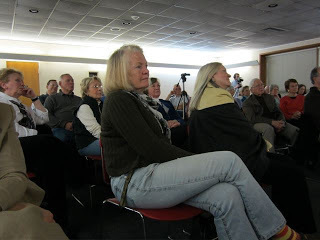
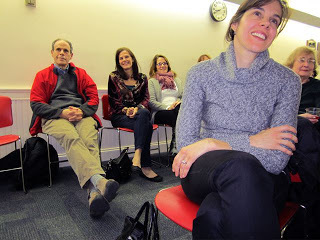
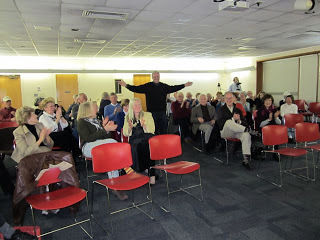
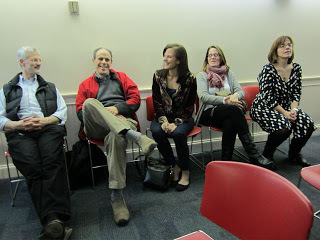
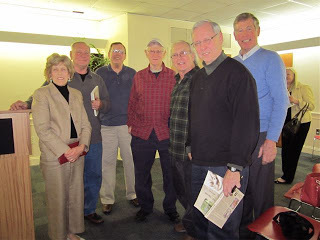
Radnor High graduates of the class of '59 came out in force last night to welcome DeWitt Henry home. Pamela Sedor, the ever-young, always-beautiful mistress of the Radnor Memorial Library, did what she does to make the evening seamless. Elizabeth Mosier and Chris Mills brought Ben Yagoda, Kelly Simmons, Cynthia Reeves, and me to their warm hearth; Kathye Fetsko Petrie brought her most ineffable self. And I was given the honor of introducing a man who has given stories—his own, those of others—a place of permanence.
This was his evening.
When
DeWitt Henry turned 30 years old, he wrote the following in a journal he was
keeping:
"I
can't get a job. I can't have the
things that normal people my age enjoy.
I can't afford a family.
When I was twenty-five, that was clearly a matter of choice. I was trying to be an artist, and I
could always give up that ambition and still succeed by worldly standards. But here I am skilled, educated, and
living alone on $4,000 where any stiff can make $10,000."
It's
classic DeWitt. Self-effacing. Never murky. Sentences built of particulates. It's also preamble.
Because DeWitt Henry wasn't actually just moping around in his thirtieth
year. He was on the verge of a
next great thing, a brand new future—not just for himself, but for all us readerly
stiffs.
So
he was frequenting a bar called Plough.
So, in the early fall of 1971, $2,000 were played against 1,000 copies
of what would become the first issue of Ploughshares,
now one of the most esteemed literary magazines in the world. What writer doesn't know Ploughshares, or lust after a Ploughshares
page? The intention was, to quote
DeWitt quoting Gordon Lish, to make "a distinct contribution to the national
adventure in writing" and, to now quote DeWitt quoting Ted Solotaroff, "to
convey the bright hope" of contemporary writing.
DeWitt
has brightened the bulb of hope in many ways throughout his career—teaching at
Harvard before becoming the Chair of Writing, Literature, and Publishing at
Emerson College, and publishing his own essays and stories, pieces that the great Tim O'Brien called "flat-out wonderful." He has made a career of launching careers while steadily tending his own.
Through
the thickness and the thinness, DeWitt Henry never forgot his roots. The house on Bloomingdale Avenue. Howard, the butcher at
Espenshade's. Kay's Dress
Shop. The Anthony Wayne Theater. St. David's Golf Club. St. Martin's Dam.
The halls of Radnor High. These
memories are the stuff of Sweet
Dreams, the memoir he'll be sharing tonight.
In
an essay called "On Aging," about running the Boston marathon, DeWitt writes "There
is the lesson of self-awareness and acceptance, beyond unrealistic
ambition...." and then: "There is
the lesson of celebrating, from your individual limits, the glory of full human
possibility." Tonight we celebrate
DeWitt Henry—self aware and wholly accepting, the absolutely full human.
[image error]




Published on January 11, 2012 03:09
January 10, 2012
Celebrating DeWitt Henry

I've been re-reading DeWitt Henry these past few days—all in anticipation of his appearance tonight at the Radnor Memorial Library.
(Be there.)
He's a man of letters, this DeWitt Henry. An essayist, novelist, and memoirist whose books include Safe Suicide, Sweet Dreams, and The Marriage of Anna Maye Potts. And while he taught at Harvard and chaired the Emerson Writing, Literature, and Publishing department (translation: he has been living in Boston for a very long time), his roots are here, where I live, along the storied Main Line.
If you know DeWitt Henry as one of the founding editors of the esteemed literary magazine Ploughshares (for he is that, too), so be it. If you are one of his nearly 5,000 Facebook friends, well—but—of course you are. But I am one of those who has the privilege of reading a passage like the one below (from Sweet Dreams) and nodding my head in recognition, for I have been there. I live there. Indeed, my son has worked at this very theater (seasonally, of course) for many, many years.
Welcome Home, DeWitt.
[image error]
The Anthony Wayne Theater, our single movie theater, was ornately Victorian, with an overhanging marquee outside and a castle-like facade. The three-sided ticket booth, with a circle to speak through and a loop to get your tickets, was out front under the shelter of a marquee.




Published on January 10, 2012 07:37
January 9, 2012
You want to write a book that is good enough

that someday she'll want to read it. Not because you brought her a Ralph Lauren swimsuit on a winter's day, but because the book itself is irreducible, somehow delicious.
Goodness. She's only three. There's still time.[image error]




Published on January 09, 2012 10:41
January 8, 2012
Celebrating a birthday with beauties
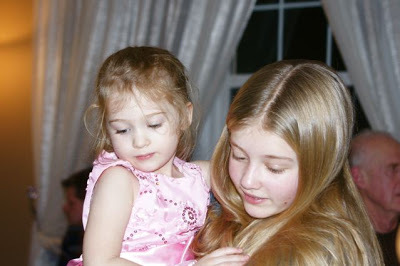
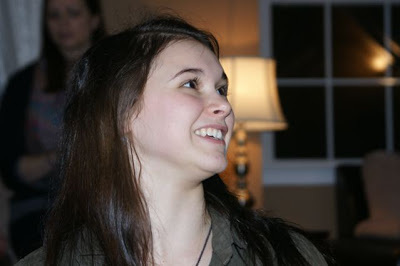

I had promised photos of Miss Eva on her third birthday. But ladies
and gentleman, I can do even better. I can and do present to you some of the other very special young ladies on the planet. Yes, the princess in pink is
our own Miss Eva. The princess beside her is Miss M, the much-discussed beauty
who dances cha cha with the old people on Thursdays and is perpetually
kind and forgiving regarding their (which is to say my) over-long steps,
bent knees, invariable mishaps.
The perfectly named Miss Mercy follows; she regales anyone lucky enough to be near her with siren tales and exquisite quips. And last but not least is Miss Cristina, who is is Eva's mom, with her brand-new baby, Miss Sophie.
It's time for me to return to work after a weekend of play and photography. But what a weekend it was. I hope you, too, spent time with those you love. It's the cure for most things, I've discovered.[image error]




Published on January 08, 2012 17:11



